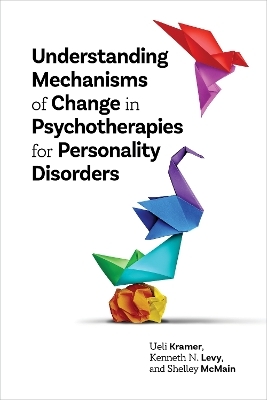
Understanding Mechanisms of Change in Psychotherapies for Personality Disorders
American Psychological Association (Verlag)
978-1-4338-3671-8 (ISBN)
- Lieferbar (Termin unbekannt)
- Versandkostenfrei
- Auch auf Rechnung
- Artikel merken
This book presents a holistic approach to treating patients with personality disorders that seeks to inspire psychotherapists and encourage innovation.
Focusing on core mechanisms of change that span different therapeutic approaches, this book invites clinicians and researchers to join a dialogue with the authors, as they examine personality disorders from different theoretical perspectives, including dialectical behavior therapy, transference‑focused therapy, plan analysis, clarification‑oriented, and emotion‑focused therapies.
The authors explore five functional domains that underlie assessment and treatment for personality disorders: emotion dysregulation, disturbed social interaction, identity problems, impulsivity, and cognitive disturbances. Each domain is analyzed through an in‑depth case example, with case conceptualizations and the careful evaluation of clinical decisions that must be made at key points in therapy. The authors then compare their different approaches, emphasizing commonalities among them while also pointing out notable differences.
They also offer clear and compelling recommendations for maintaining and strengthening the therapeutic alliance. The final chapter synthesizes key takeaways from across the book to create a clear path towards enhancing clinical practice.
Ueli Kramer, PhD, is professor for psychiatry and psychotherapy; director of the Institute of Psychotherapy at the department of psychiatry, University of Lausanne, Switzerland; and adjunct professor at the department of psychology, University of Windsor, Canada. His research focuses on process and outcome in psychotherapy, in particular the mechanisms of change in treatments of personality disorders, and case formulation in personality disorders. Dr. Kramer is past president of the European Society for Psychotherapy Research and current president of the European Society for the Study of Personality Disorders. Kenneth N. Levy, PhD, is a tenured professor, associate director of clinical training, and was interim codirector of the Psychological Clinic in the department of psychology at Pennsylvania State University, where he directs the Laboratory for the Study of Personality, Psychopathology, and Psychotherapy. He is a certified transference-focused therapist, teacher, and supervisor. Dr. Levy’s clinical and research interests are attachment theory, personality disorders, and the psychotherapy process and outcomes. Dr. Levy’s work has led to recognition for organizations such as the American Psychological Association, the North American Society for the Study of Personality Disorders, and the American Psychoanalytic Association. Shelley McMain, PhD, is head of the Borderline Personality Disorder Clinic and senior scientist at the Centre for Addiction and Mental Health in Toronto, Canada; director of the Psychotherapy, Humanities and Psychosocial Interventions Division; associate professor of psychiatry at the University of Toronto; and president of the Transitional Board of the World Federation of Dialectical Behaviour Therapy. Dr. McMain's clinical interests include dialectical behavior therapy, borderline personality disorder, emotion regulation, and mechanisms of change. Her work has been recognized by various international professional associations, including the European Society for the Study of Personality Disorders and the American Psychoanalytic Association.
Introduction. Synthesizing Diverse Perspectives on Personality Disorders
Chapter 1. The Importance of Developing a Focus on Mechanisms of Change in Psychotherapy
Chapter 2. Personality Disorders: A Conceptualization in Functional Domains
Chapter 3. The First Session of Psychotherapy and Getting Started in Treatment
Chapter 4. Moving From Emotional Dysregulation to Emotional Balance
Chapter 5. Moving From Problematic Social Interactions to Interpersonal Effectiveness
Chapter 6. Moving From Identity Diffusion to an Integrated Sense of Self
Chapter 7. Moving From Impulsive Behavior to Self-Reflection
Chapter 8. Moving From Cognitive–Perceptual Disturbances to Coherent and Reality-Based Narratives
Chapter 9. Challenges in the Therapeutic Relationship and How to Use Them Productively in Psychotherapy
Chapter 10. Discussing Mechanisms of Change in Psychotherapies for Personality Disorders
References
Index
About the Authors
| Erscheinungsdatum | 23.02.2024 |
|---|---|
| Verlagsort | Washington DC |
| Sprache | englisch |
| Maße | 152 x 229 mm |
| Themenwelt | Geisteswissenschaften ► Psychologie ► Persönlichkeitsstörungen |
| Geisteswissenschaften ► Psychologie ► Psychoanalyse / Tiefenpsychologie | |
| Medizin / Pharmazie ► Medizinische Fachgebiete ► Psychiatrie / Psychotherapie | |
| ISBN-10 | 1-4338-3671-8 / 1433836718 |
| ISBN-13 | 978-1-4338-3671-8 / 9781433836718 |
| Zustand | Neuware |
| Haben Sie eine Frage zum Produkt? |
aus dem Bereich


